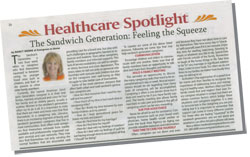By Nancy Webre, BS, MS
 The Sandwich Generation, a new buzz word, refers to caregivers who find themselves squeezed in between caring for younger loved ones such as children, and their elder parents or other elder family members.
The Sandwich Generation, a new buzz word, refers to caregivers who find themselves squeezed in between caring for younger loved ones such as children, and their elder parents or other elder family members.
Currently, the typical American Sandwich Generation caregiver is in their mid-forties, married, employed and cares for his/her family and an elderly parent, usually a mother. Women in the sandwich generation often try to do it all. It is important to note that there are more and more men that find themselves in a caregiving role. Likewise, there is an increasing segment of family and sandwich generation caregivers that live in rural communities. And, often rural caregivers find themselves removed from readily available and professionally organized support services and care networks. They may also find themselves not only carrying the normal burdens that are associated with providing care for a loved one, but also with such challenges as geographic barriers to resources and isolation from other caregivers, family members and informal supports. This lack of service availability can add to caregiver stress, burnout and even depression. This stress takes its toll not only on personal relationships with spouses and children but also on the caregivers own well-being as they struggle to take better care of themselves.
Some of the most common stressors that affect both urban and rural sandwich generation caregivers are:
- How do I find resources that I need for myself and my parent?
- How much of my time is too much time in care-giving roles?
- How do I divide my time between by own family/children and my parent?
- How do I keep generational peace between my kids and parent?
- How do I find time for my marriage?
- How do I find time for myself?
- How do I deal with my feelings of isolation?
- How do I deal with my feelings of guilt for not having enough time to accomplish all that I “should” be doing?
To counter act some of the above listed stressors, following are some tips that may help sandwich generation caregivers:
Communication
Encourage children and elders to communicate with one another. Make sure that all family members have an opportunity to talk abut and share their thoughts and feelings.
Hold a family meeting
This provides an opportunity to discuss the many care-giving tasks that need to be accomplished each day or week. Mutual expectations should be set regarding how many tasks of care-giving will be accomplished. Care-giving is often a one person show but it does not need to be if you have family support. The family meeting also allows family members to take part and share in the gift of care-giving which can be very rewarding.
Ask for assistance
Never be afraid to ask for assistance. Contacting resources such as your loved one’s physician, home health social worker or even the local Area Agency on Aging can provide valuable resources and information.
Take time to care for yourself
Often, caregivers are run down and even sick because they have not taken time to care for themselves. Take time every day to “check-in” with yourself, even if it is 10 minutes. Enjoy this time for reading, exercising, listening to music or whatever you like to do. Spend time with friends outside of the family. Remember to laugh at the funny things in life. Take time to be “in” your marriage or significant relationships. Listen to your body. Too often we do not listen to our bodies no matter how loudly they may be talking to us.
As Mother’s Day approaches it’s a good time for moms and their families to recognize the importance of addressing stress and managing it in healthy ways. Mothers often put their family needs first and neglect their own. Every caregiver situation is unique but there are always common factors which bridge these situations and caregivers together. It is easy to become lost in the care-giving you are providing but it is important to remember that support can come in many different sources. For those who are feeling “squeezed” in the sandwich generation, you are not alone and assistance can often be just a phone call away.
As seen in Cascade Business News: The Sandwich Generation: Feeling the Squeeze
May 2012

